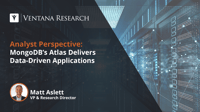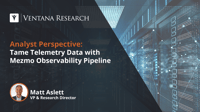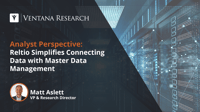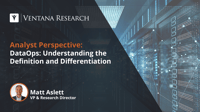The recent publication of our Value Index research highlights the impact of intelligent applications on the operational data platforms sector. While we continue to believe that, for most use cases, there is a clear, functional requirement for either analytic or operational data platforms, recent growth in the development of intelligent applications infused with the results of analytic processes, such as personalization and artificial intelligence (AI)-driven recommendations, has increasing...
Read More
Topics:
Analytics,
Business Intelligence,
Cloud Computing,
Data,
Digital Technology,
Analytics & Data,
analytic data platforms,
Operational Data Platforms
As engagement with customers, suppliers and partners is increasingly conducted through digital channels, ensuring that infrastructure and applications are performing as expected is not just important but mission critical. My colleague, David Menninger, recently explained the increasing importance of observability to enable organizations to ensure that their systems and applications are operating efficiently. Observability has previously been the domain of the IT department but is increasingly...
Read More
Topics:
Data Management,
Data,
Digital Technology,
Analytics & Data
I have written recently about the increasing importance of managing data in motion and at rest as the use of streaming data by enterprise organizations becomes more mainstream. While batch-based processing of application data has been a core component of enterprise IT architecture for decades, streaming data and event processing have often been niche disciplines typically reserved for organizations with the highest-level performance requirements. That has changed in recent years, driven by an...
Read More
Topics:
Data,
Streaming Data & Events
To execute more data-driven business strategies, organizations need linked and comprehensive data that is available in real time. By consistently managing data across siloed systems and ensuring that data definitions are agreed and current, organizations can overcome the challenges presented by data being distributed across an increasingly disparate range of applications and data-processing locations. Maintaining data quality is a perennial data management challenge, often preventing...
Read More
Topics:
Data Management,
Data,
data operations
Data Operations (DataOps) has been part of the lexicon of the data market for almost a decade, with the term used to describe products, practices and processes designed to support agile and continuous delivery of data analytics. DataOps takes inspiration from DevOps, which describes a set of tools, practices and philosophy used to support the continuous delivery of software applications in the face of constant changes. DataOps describes a set of tools, practices and philosophy used to ensure...
Read More
Topics:
Data Governance,
Data Management,
Data,
data operations















